Fiar-an, La’o ba oin – meaning “believe in yourself, keep moving forward” – is a popular Timorese motto, and I found myself repeating it often during a recent learning exchange between the women of Ataúro Homestay Association and Agora Food Studio (AFS). This event had been long in the making, and much anticipated. My Blue Ventures colleagues and I dreamt it up months ago, while sipping flat whites made with Timorese coffee in AFS – a social enterprise based in Dili, and a member of the Slow Food movement, that focuses on celebrating Timor-Leste’s produce and food culture.
I have lived with a homestay family on Ataúro Island in Timor-Leste for over a year, and my wonderful homestay host Dina almost single-handedly feeds me and nine other members of the family every day – a feat I consider a pretty major achievement! Despite this, I have often noticed a lack of confidence in Dina when we’ve talked about food and cooking.
She is not alone in this, the women on Ataúro are working hard to improve their families’ nutrition but they are doing it with relatively little access to water and electricity, limited knowledge of nutrition, and practically no access to crops that can’t be grown on the island. These are big challenges to overcome, but I have thought for a while that anything that could help these women in their endeavour would be greatly appreciated and worthwhile.
Despite the quality of traditional Timorese dishes, often influenced by Portuguese or South East Asian culinary techniques, AFS is one of the few organisations that explores and celebrates Timor-Leste’s cuisine. They’re also proud to support Timorese coffee, which grows wild and organic in the jungle and which accounts for a massive 90% of the country’s non oil-based exports.
After hearing about Blue Ventures’ work with Ataúro Homestay Association, it did not take long for the co-founders of AFS – Alva Lim and Mark Notaras – to begin working with us to develop an exchange event aimed at sharing their perspective on Timorese cuisine with the women from the homestay families.
The main objectives of this event were to build the participants’ confidence in sharing their traditional foods by celebrating their knowledge and skills; to enable them to produce more nutritious and varied meals for their families and homestay guests; and last but not least to have a fun day where the women would be the centre of attention, and have an opportunity to learn together, share their experiences and get some new ideas.
The day started at 8:30 when the women – all dressed to impress – and I met at the Lorosa’e English Language Institute – home to AFS. We made our way up the stairs to the restaurant, where calls of “Welcome!” met our ears as we opened the doors. The environment was already very different to the women’s kitchens in Beloi village, and I could see everyone looking around and taking it all in as we were ushered towards a large and beautifully set table. Already the day felt like a special occasion and we hadn’t even begun our delicious breakfast of cooked banana!
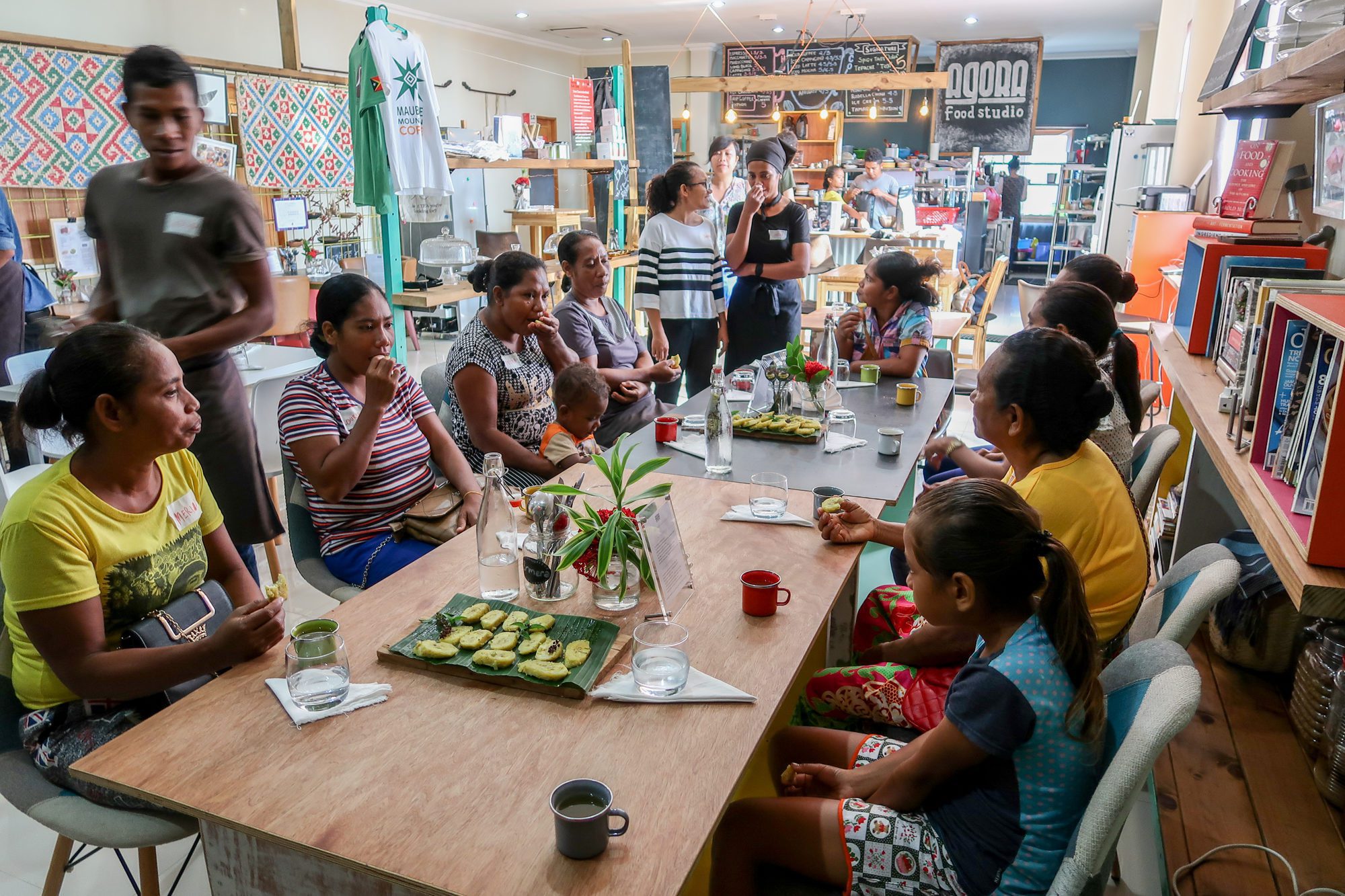
Breakfast at AFS | Photo: Jenny House
We were then introduced to Safira and Nuqy – a food researcher and chef respectively. These two incredible women were the main facilitators during the day in addition to Kelo, originally from Ataúro himself, who was able to offer valuable insight into the island’s context. These three young people are all part of the fantastic AFS team, and part of the organisation’s efforts to mentor and encourage Timorese innovators in food, coffee and tourism.
Conversation began to flow immediately, as the women discussed the ingredients in their breakfast, the disadvantages of cooking with processed ingredients and the possibility of cooking with coconut oil as an alternative to palm oil. Dina commented to me at one point,
It’s not even 9am and I’ve already learned something. We have lots of coconuts on Ataúro but we don’t cook with them like this.”
The next session started off with a map of Ataúro, which the participants filled in with dishes and ingredients that are commonly used in each area. Kelo is from a different part of the island to the Homestay Association, and a few of the women had moved to Beloi from other areas, so each person’s perspective was included. The discussion became lively as they considered the traditional foods from their home villages and compared which ingredients could be counted upon during different times of year.
On Ataúro, and in many other parts of Timor-Leste, water access can be a big problem and this affects food availability a great deal, so much so that the period from November to February is often called the “Hungry Season.” To help with this challenging time of year, Safira and Alva led a discussion about what foods could still be accessed during the Hungry Season, and how to make the most of them.
As well as being useful for the participants, these classroom sessions also enabled the AFS staff to learn more about food culture on Ataúro, a knowledge exchange that hopefully lays the foundations for more collaboration in the future.
The focus of the next session was how to combine the ingredients discussed into nutritious and delicious meals. Safira and Nuqy made it clear to the group that they knew that the participants could already cook well, but that this session was about incorporating new approaches and ideas. Nuqy brought two beautiful meals into the classroom and each participant was able to try them whilst Nuqy explained each meal and why the ingredients worked well together: soft and crunchy, sweet and salty, heavy and light etc.
As homestay hosts, the participants have already had to deal with dietary requirements such as vegetarian or gluten-free, so there was also a discussion about the best ingredients and recipes to accommodate these.
The session ended with a chance to explore the busy restaurant kitchen and see some of the lunch dishes being prepared. We then shared a lovely family-style meal and discussion with the rest of the Blue Ventures team. Everyone particularly enjoyed the foods which were inspired by dishes used on Ataúro, and were interested in the twists that the AFS team had made to the recipes. One of the things that stood out the most were their flat white coffees, which were very different to the sweet, milk-free coffee that everyone drinks on the island. These coffees made quite the impression, and at our reflection session later they were front and centre on the participant’s list of things that had surprised them during the exchange.
The rest of the day was spent observing, tasting and practicing new recipes and techniques in the AFS kitchen, including poached eggs, flatbreads made with Timorese sweet potato, pumpkin fritters (with a gluten-free version of the recipe), and jam. The AFS team had carefully selected techniques that can be easily transferred to cooking on a fire with ingredients that are readily available on Ataúro.
Everyone took lots of notes while they worked, so that they could use these new ideas at home, and it was wonderful to see how engaged they all were. We ended the day with a short reflection session, writing down what had surprised the participants during the day, and what they would like to learn more about in the future. Both lists could barely fit on the board!
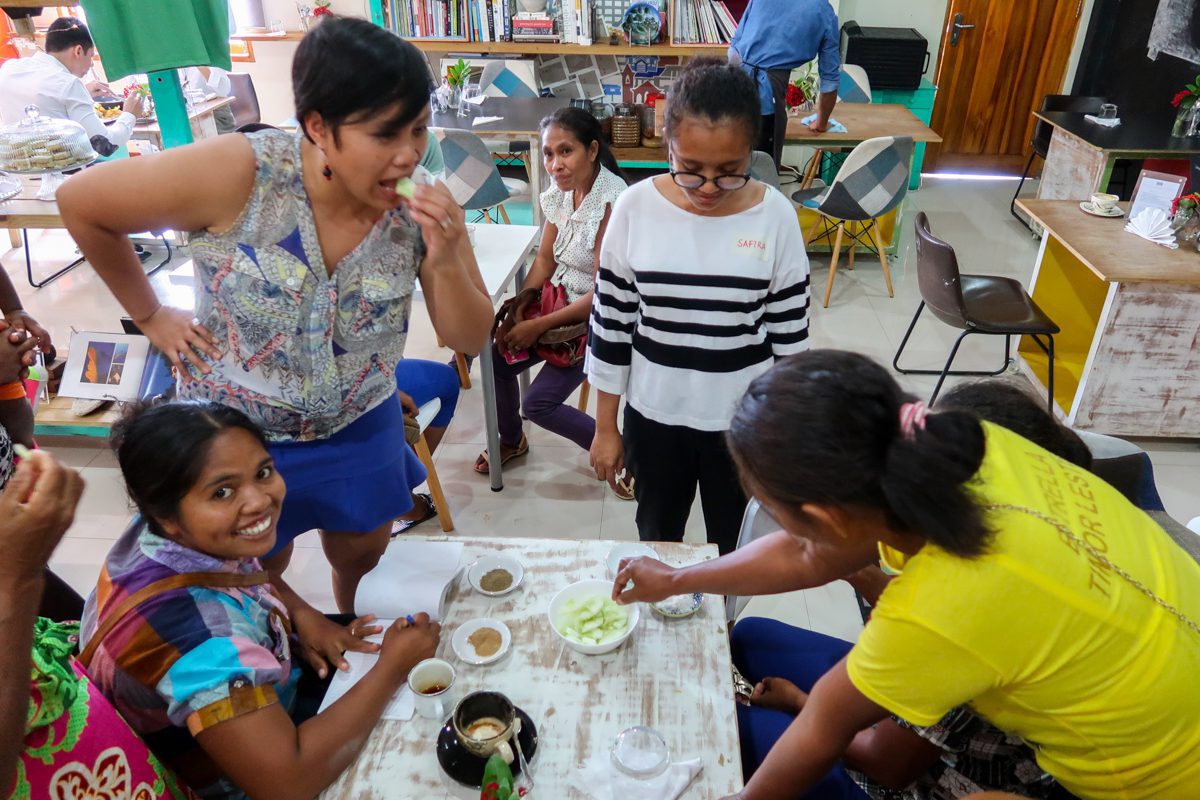
Salt tasting | Photo: Jenny House
It has now been a few months since the visit to AFS in Dili, and Dina has been regularly implementing new ideas in our home: cooking with coconut oil instead of palm oil and serving more ambitious traditional dishes. On top of those obvious changes, I’ve also noticed a new enthusiasm for discussing food and cooking. Last week she took me by the hand to explore the crops in the garden, pointing out what we would be eating for dinner later that day.
The homestay association host a welcome dinner when a new group of volunteers arrive on Ataúro, and it’s great to see the women trying out new ideas and feeling more confident in themselves and their cooking. The volunteers never fail to be impressed by the delicious banquet style meal.
I hope that the members of Ataúro Homestay Association, both the men and the women, continue to go from strength to strength. In Tetun, the national language of Timor-Leste, the word agora means “now” and I think that the results of the exchange with Agora Food Studio are a sign that the members of Ataúro Homestay Association are not waiting around, they are ready to grow and learn, and are looking forward to the next chapter.
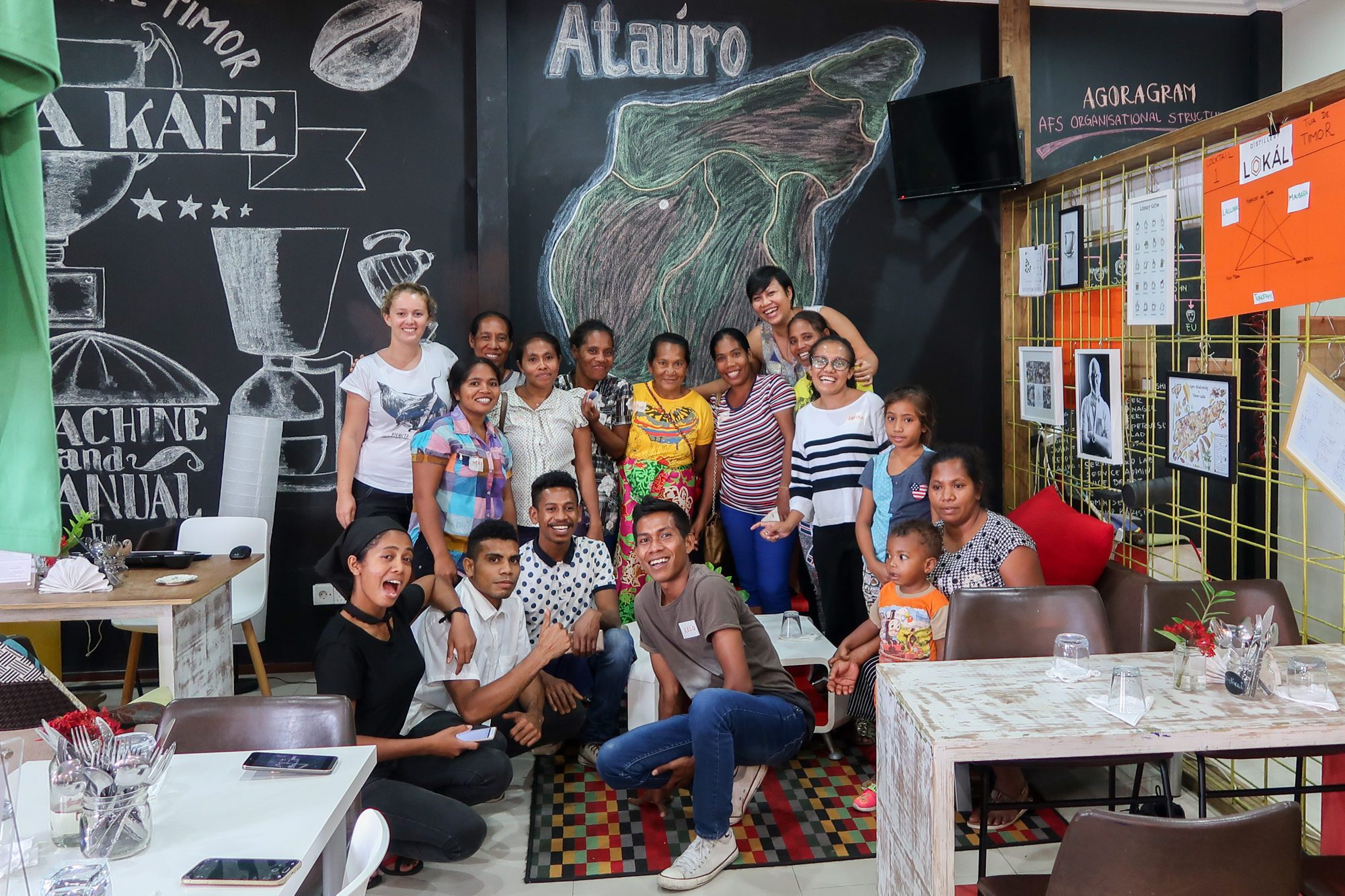
The whole exchange group | Photo: Jenny House
Experience the delicious food and wonderful hospitality of Ataúro Island for yourself, and join a dive trip!
Blue Ventures would like to thank our supporters and funders including the Darwin Initiative through UK Government funding, the GEF through UNEP under the Dugong and Seagrass Project, and Wilstar.

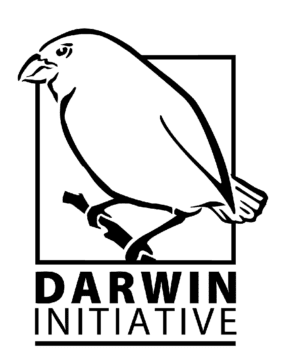


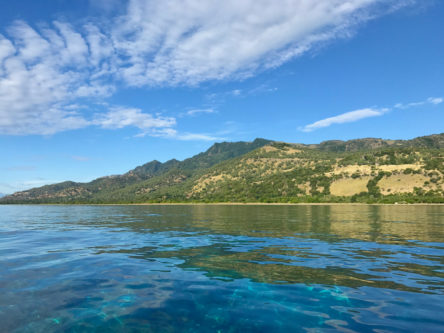
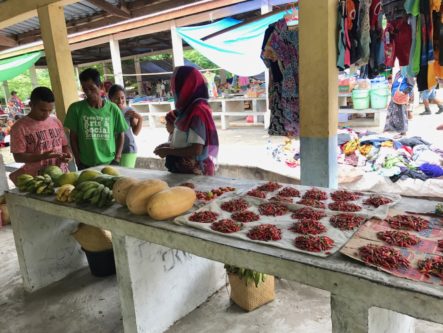
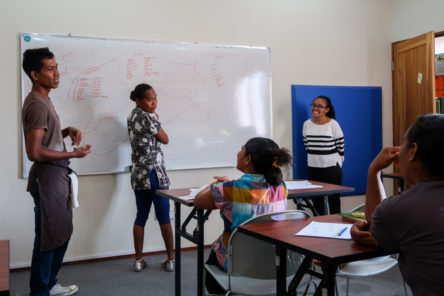
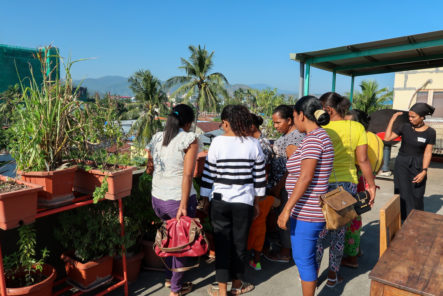
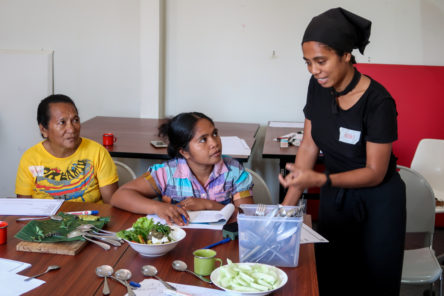
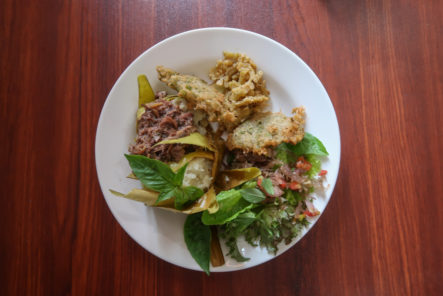
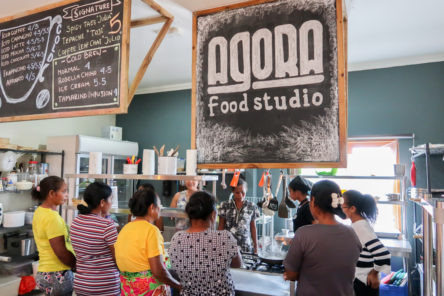
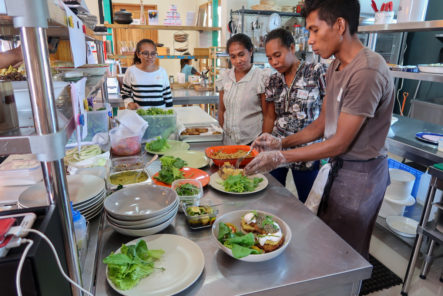
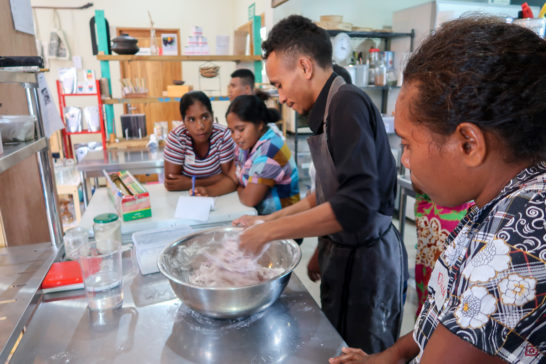
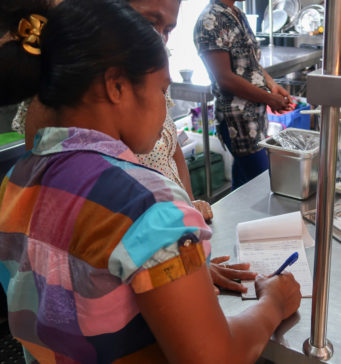
This looks brilliant. I remember having a lovely lunch at the Agora Food Studio when we visited. It is great to see this work developing and having a great impact’now’. Thanks for the post, hope to be back this year